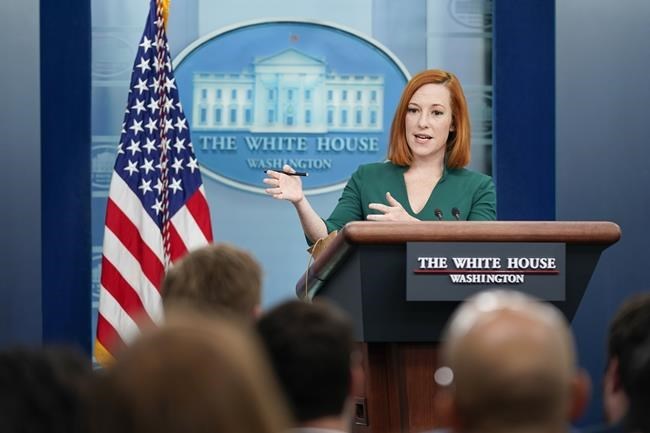WASHINGTON (AP) ŌĆö President Joe Biden is sending his national security adviser for talks with a senior Chinese official in Rome on Monday as concerns grow that in the Ukraine war and may help Russia evade punishment from economic sanctions.
The talks between national security adviser Jake Sullivan and senior Chinese foreign policy adviser Yang Jiechi will center on ŌĆ£efforts to manage the competition between our two countries and discuss the impact of RussiaŌĆÖs war against Ukraine on regional and global security," said Emily Horne, speaking for the White House national security council.
The White House has accused Beijing of spreading false Russian claims that Ukraine was running chemical and biological weapons labs with U.S. support. U.S. officials said China was for a potential biological or chemical weapons attack on Ukrainians by the Russian military.
Sullivan said on NBC's ŌĆ£Meet the PressŌĆØ on Sunday that when Russia starts accusing other countries of preparing to launch biological or chemical attacks, ŌĆ£itŌĆÖs a good tell that they may be on the cusp of doing it themselves.ŌĆØ
He also said China and other countries should not try to help Russia work around the sanctions and the U.S. has made it clear that other countries should not bail out the Russian economy. ŌĆ£We will ensure that neither China nor anyone else can compensate Russia for these losses,ŌĆØ Sullivan said.
The striking accusations about Russian disinformation and Chinese complicity came after Russian Foreign Ministry spokeswoman Maria Zakharova alleged with no evidence that the U.S. was financing Ukrainian chemical and biological weapons labs.
The Russian claim was echoed by Chinese foreign ministry spokesman Zhao Lijian, who claimed there were 26 bio-labs and related facilities in ŌĆ£which the U.S. Department of Defense has absolute control.ŌĆØ The United Nations has said it has received no information backing up such accusations.
White House press secretary Jen Psaki last week called the claims ŌĆ£preposterous."
ŌĆ£Now that Russia has made these false claims, and China has seemingly endorsed this propaganda, we should all be on the lookout for Russia to possibly use chemical or biological weapons in Ukraine, or to create a false flag operation using them,ŌĆØ Psaki tweeted Wednesday night. ŌĆ£ItŌĆÖs a clear pattern.ŌĆØ
Sulllivan, who appeared on several of the Sunday news shows before his trip, told ŌĆ£Face the NationŌĆØ on CBS that the Russian rhetoric on chemical and biological warfare is an indicator that in fact the Russians are getting ready to do it and try and pin the blame elsewhere and nobody should fall for that.ŌĆØ
The international community for years has assessed that Russia has used chemical weapons in carrying out assassination attempts against Putin detractors such as Alexei Navalny and former spy Sergei Skripal. Russia also supports the Assad government in Syria, which has used chemical weapons against its people in a decade-long civil war.
Testifying before the Senate Intelligence Committee on Thursday, CIA Director William Burns also noted grave concern that Russia might be laying the groundwork for a chemical or biological attack of its own, which it would then blame on the U.S. or Ukraine in a false flag operation.
ŌĆ£This is something, as all of you know very well, is very much a part of RussiaŌĆÖs playbook,ŌĆØ he said. ŌĆ£TheyŌĆÖve used these weapons against their own citizens, theyŌĆÖve at least encouraged the use in Syria and elsewhere, so itŌĆÖs something we take very seriously."
China has been one of few countries to avoid criticizing the Russians for its invasion of Ukraine. China's Xi Jinping hosted Russian President Vladimir Putin for the opening of the Winter Olympics in Beijing, just weeks before Russia launched the Feb. 24 invasion.
During Putin's visit to China last month, the two leaders issued a 5,000-word statement declaring ŌĆ£no limitsŌĆØ in the friendship between the two countries.
The Chinese abstained on U.N. votes censuring Russia and has criticized economic sanctions against Moscow. It has expressed its support for peace talks and offered its services as a mediator, despite questions about its neutrality and scant experience mediating international conflict.
Chinese officials have also said Washington shouldnŌĆÖt be able to complain about RussiaŌĆÖs actions because the U.S. invaded Iraq under false pretenses. The U.S. claimed to have evidence Saddam Hussein was stockpiling weapons of mass destruction though none was ever found.
For Russia, China could be a crucial economic partner in levied by the U.S, Britain, the 27-national European Union and other countries, though there are questions how far Beijing will go to alienate the alliance and put its own economy at risk.
The Biden administration is looking to impress on China that any efforts to ease sanctions for Russia could have ramifications for its relations with the United States and Western allies.
Sullivan and Yang last met for face-to-face talks in Switzerland, where Sullivan raised the Biden administration's concerns about China's military provocations against Taiwan, human rights abuses against ethnic minorities and efforts to squelch pro-democracy advocates in Hong Kong.
That meeting set the stage for a in November between Biden and Xi.
Sullivan is also to meet Luigi Mattiolo, diplomatic adviser to Italian Prime Minister Mario Draghi, while in Rome.
Aamer Madhani And Josh Boak, The Associated Press


